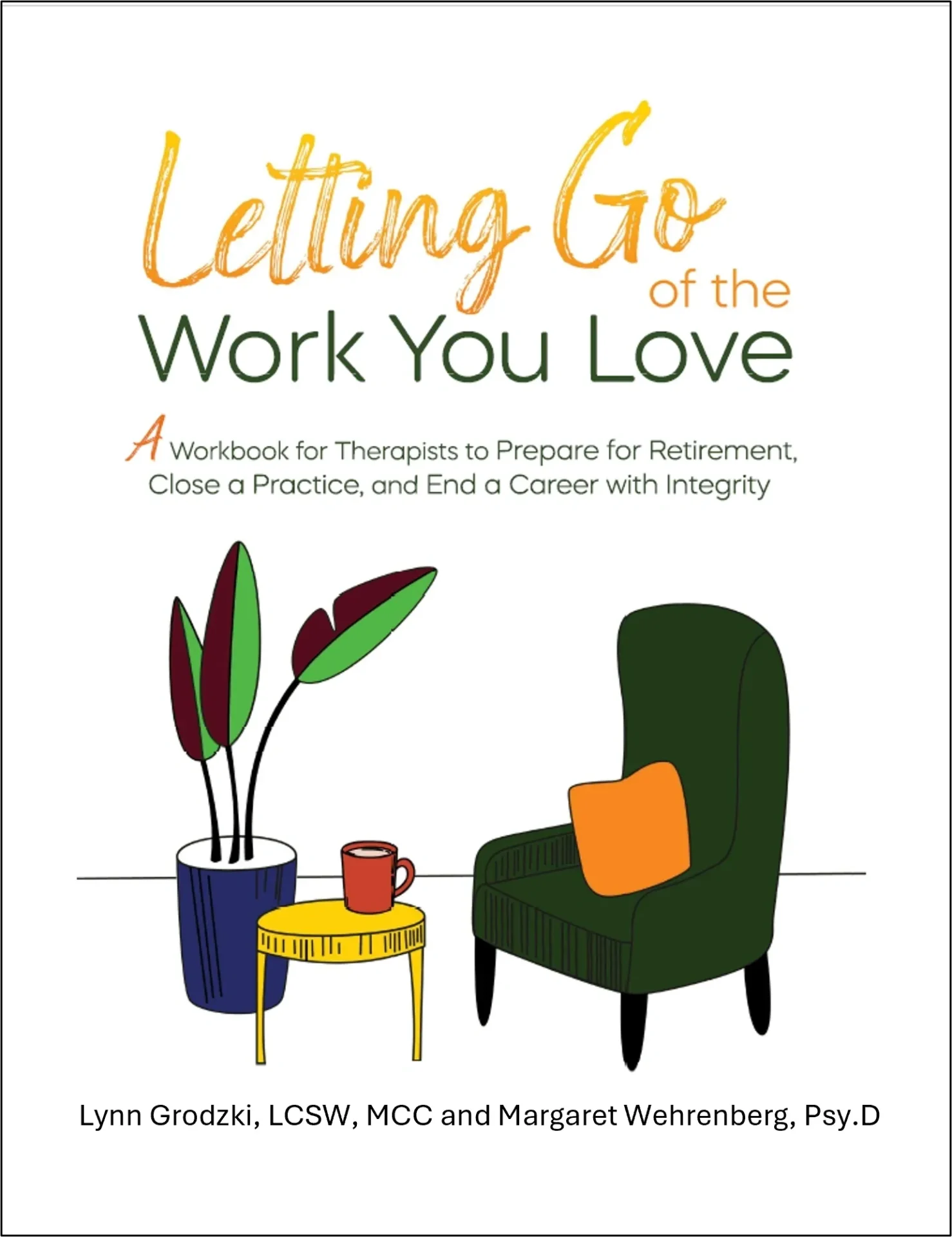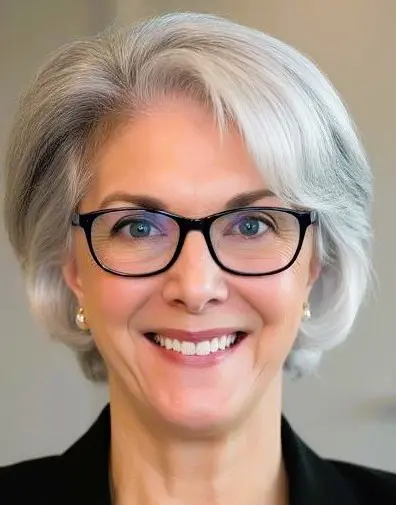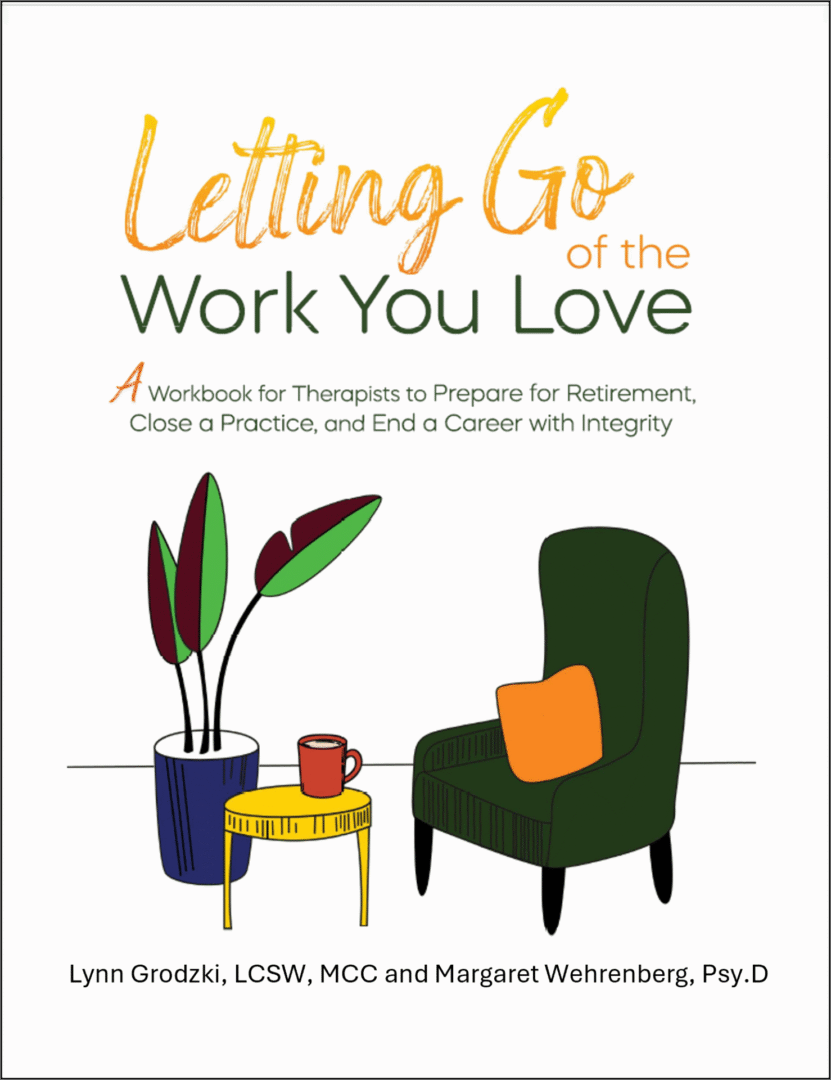Letting Go of the Work You Love Do you know how to retire and close your practice without abandoning your clients?
When it becomes necessary to stop working and close your caseload or career due to retirement, illness, or incapacity, learn how to prepare yourself and your clients ethically and compassionately. Below, see workshops, seminars and groups that support the new workbook that helps you move through the four stages of the Readiness for Retirement Model with clarity and grace.
Lynn Grodzki, LCSW, MCC and Margaret Wehrenberg, Psy.D
As more than 60,000 therapists each year approach retirement age, you may find yourself asking: When is the right time to end my practice? How do I prepare my clients for this transition? Will leaving them in the midst of their ongoing therapy process be traumatizing? And how do I manage my own anxiety, guilt, and concerns about letting go?
Whether you have a planned or unplanned ending to your work, therapists are bound by strict ethical codes that require you not to abandon your clients. Retiring isn’t as simple as walking away—it demands careful planning, clear timing, and transparent communication. For many therapists in leadership roles—those managing group practices, clinics, or agencies—the complexity is compounded by the added responsibilities of those they lead.
To end their caseloads, therapists must be prepared to cope with the full range of client emotions and know how to prepare for the impact of loosening the very real and necessary attachment bonds that allow therapy to be successful—both for themselves and their clients. This is a complex clinical and ethical process, one that is unfamiliar for most therapists.
Until now, the clinical steps and skills of letting go of a caseload have been unexplained and rarely discussed. But all of us will close our caseloads and careers at some point and doing this well, without harm to our clients, requires a deep understanding of the process of what occurs when the important therapeutic process suffers a disruption, based on the therapist’s needs, not the clients. To care for those we treat during the ending process means having the right approach, information and expert guidance.
Zoom Workshops
- Workshops
- Seminars
- Mentoring groups
These interactive experiences provide you with the knowledge, information, case examples and support you need to know how to begin to plan for the end of your work with compassion and care and upholding ethical considerations.
Lynn Grodzki and Margaret Wehrenberg offer a groundbreaking roadmap for therapists preparing to step away from their professional roles, whether by choice, necessity, or life change. Learn how to leave your practice with the same intention, grace, and compassion you’ve always given to your work.
Upcoming Zoom Workshops:

Thursday, Feb 26 / Letting Go with Grace, 4 HR, CEs available/ Higher Thought Institute /
"Letting Go with Grace: The Hidden, Complex Psychology of Retirement: Guiding Clients—and Yourself—Through a Major Life Transition"
For you and/or to help your clients who are nearing retirement age or stage of life.
For more information on the webinar and to register, go to: https://webinars.htilearn.com/cart/2739ee6b-f251-47bb-acc9-a4b519f99f33
Go deeper: New 6-session Seminar, 9 CEs
Thursday, March 12, 2026
4:00 PM - 5:30 PM
"Beyond Letting Go with Grace: An Advanced, Collegial 6-Session Seminar for Clinicians Navigating Retirement"
Session 1: Precontemplation & Identity
Session 2: Contemplation & Your History of Endings
Session 3: Preparation: Practical Steps
Session 4: Emotional Readiness
Session 5: Legacy, Values & Next-Life Chapter Planning
Session 6: Integration & Visioning
Register and info here:
More to come in 2026
More to come in 2026
Need
The complexity of planned and unplanned retirement for therapists lies in the profound, irreplaceable bond we form with our clients. The trust we build, the lives we touch, and the deep conversations we share make us central to our clients' well-being. Walking away from these relationships is not just emotionally challenging; it can feel nearly impossible. Therapists and their clients are unfamiliar with how to develop a positive, ethical, compassionate ending process when the therapist must end treatment due to retirement, illness or incapacity.
Perhaps the most pressing issue is the glaring lack of guidance and consideration about the many aspects required to end a caseload ethically and compassionately. While we are all trained to start treatment with a focus on building rapport and setting goals, and then learn to refine our clinical skills and methods throughout our careers, knowing how to close a caseload for our own reasons of retirement or incapacity—without causing trauma or undue upset to clients—has been virtually ignored in our professional development, until now.


Who Should Attend
Counselors, marriage and family therapists, psychotherapists, social workers, psychologists, chaplains, psychiatric nurses, life coaches, doctors and other personal growth and health providers.
Bio

Lynn Grodzki is a Licensed Certified Clinical Social Worker (LCSW-C) and a Master Certified Coach (MCC) with over 30 years of experience working as a psychotherapist and business coach for therapists. She is the author of six books including “Building Your Ideal Private Practice” and “Therapy with a Coaching Edge” and frequently presents at national conferences.

Margaret (Peg) Wehrenberg, Psy.D. Is the author of 11 books on the treatment of anxiety and depression, including her best-selling “The 10 Best-Ever Anxiety Management Techniques”. She has crossed the USA and traveled internationally to train psychotherapists, working with a variety of organizations. She blogged for Psychology Today on depression.
Both Lynn and Margaret have presented over many years at the Psychotherapy Networker Symposium and have, individually and together, written many articles for the Psychotherapy Networker Magazine.
Together, they have co-authored the new, groundbreaking book: Letting Go of the Work You Love: A Workbook for Therapists to Prepare for Retirement, Close a Practice and End a Career with Integrity (PESI, August 20205)

